Faculties and Institutes |
|||
The Faculty of Mathematics and Informatics |
|||
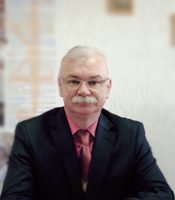 |
|||
| The Dean of the Faculty | |||
| Oleg I. RUDNITSKY, Associate Professor, Candidate of Physical and Mathematical Sciences Phone: +38 (0652) 63-75-42 E-mail: dmath@list.ru |
|||
History |
|||
The Faculty was organized as the Faculty of Physics and Mathematics in 1918. From the very first years, it had brilliant scholars as its faculty members, who represented the leading mathematical schools of that time. |
|||
Soon after its organization, Professor N. M. Krylov, the representative of Petersburg school of mathematicians, gave the report to the Council of Tavricheskiy University with suggestion to organize at the Faculty Mathematical Study Room, which was opened in January 1919. A large amount of work was done by the Study Room in 1919, since February till November. In 1917—1920-s, N.M.Krylov was the Head of the Department of Mathematics, Mathematical Study Room, and the Editor of The Mathematical Study Room Records. During the past years, Associate Professors B..A. Manson (Dpt. of Mathematical Analysis), V.N. Skrydlov (Dpt. of Geometry), Professors A.V. Kuzhel (Dpt. of Algebra and Theory of Numbers). S.I. Cherskiy ( Dpt. of Differential and Integral Equations) were the heads of departments who fruitfully maintain pedagogical and scientific activity at the Faculty. In due time the Faculty was divided into two – Mathematical and Physical. Since 2000, it has become the Faculty of Mathematics and Informatics. This choice was influenced by growing importance of applied and theoretical mathematical researches in the sphere of theory of information, theory of calculations, theory of algorithms, theory of programming, and growing evaluation of teaching correspondent disciplines. Today the Faculty is a fully developed University division with its specific traditions, academic schools and education techniques. These achievements are connected, first of all, with powerful teaching staff: 6 professors, doctors of physico-mathematical sciences, and 32 Associate Professors, candidates of physico-mathematical sciences. 758 day-time students, 117 correspondent and external students, 20 postgraduate students are studied at 6 departments. Every year best students are awarded with nominal grants for their success in educational and research work.
Graduates Profile
A graduate with speciality "Computer science" is prepared for research work in the field of theoretical (mathematical) computer science, practical activities on realization of information projects, program complexes, system dataware, new information technologies, as well as for teaching computer science as fundamental discipline in the hire and high educational institutions on the basis of modern achievements in theoretical computer science. He can teach mathematics as a related subject, work in scientific research institutes, educational institutions, computer centers, information-analytical departments. The graduate with speciality " Applied Mathematics " is prepared for research, practical and educational work in the field of mathematics, mechanics, computer science, applied economy and physics. He is prepared for the problem decision in mathematical modelling and numerical analysis in various areas of natural sciences. He can professionally teach computer science in educational institutions, work in scientific research institutes, educational institutions, information-analytical departments, in manufacture and business.
Scientific Work
Education The Faculty trains Bachelors, Specialists and Masters in three specialities: Mathematics, Informatics, and Applied Mathematics. Students of Mathematics choose one of the following specialisations in their third year: Mathematical Analysis, Theory of Functions, Differential Equations, or Geometry. Students of informatics specialise in Applied Informatics. Students of Applied Mathematics specialise in Mathematical Modelling.
Academic and Educational Relations
Publications (in original languages) |
|||
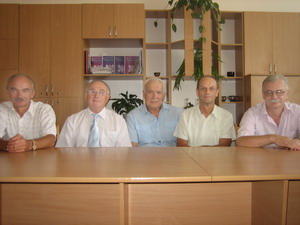
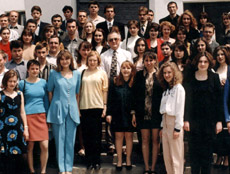 A graduate with speciality "Mathematician" is prepared for research, practical and educational work in the field of mathematics. He can professionally teach mathematics and computer science in any of educational institutions or work in R&D establishments and analytical departments.
A graduate with speciality "Mathematician" is prepared for research, practical and educational work in the field of mathematics. He can professionally teach mathematics and computer science in any of educational institutions or work in R&D establishments and analytical departments.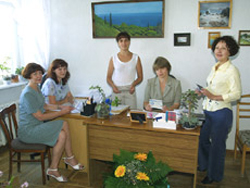 The Faculty hosts the following scientific schools and conferences: Crimean Autumn Mathematical School on Spectral and Evolutionary Problems; International Scientific Conference on Intellectual Information Processing; the Crimean International Mathematical School on Liapunov Method of Functions and its Applications.
The Faculty hosts the following scientific schools and conferences: Crimean Autumn Mathematical School on Spectral and Evolutionary Problems; International Scientific Conference on Intellectual Information Processing; the Crimean International Mathematical School on Liapunov Method of Functions and its Applications.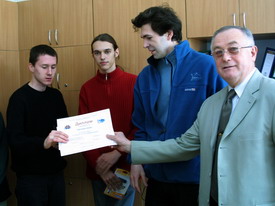 The Faculty has wide scientific relations with mathematicians of different countries of the world. Among the establishments that cooperation is maintained are: Regensburg University, Germany (Professors R. Menniken, C. Tretter. R. Denk, V. Hardt. Professor N.D. Kopachevsky reads lectures there on the invitation of Regensburg University); Lomonosov Moscow State University and the RAS Computer Centre, Russia (The Department of Functional Analysis and Functions Theory of the Faculty of Mathematics and Mechanics – Professors A.G. Kostyuchenko, A.A. Shkalikov, V.V. Vlasov; The Faculty of Computational Mathematics and Cybernetics – Academician Yu.I. Zhuravlyov, Corresponding member K.V. Rudakov), joint scientific researches in mathematical models of recognition, forecasting and decision-making, Tel Aviv University, Israel (Professor Israel Gohberg, V. A. Grinshtein), joint scientific researches in mathematical modelling in mechanics of continuous environments, Janos Bolyai Mathematical Society, Hungary.
The Faculty has wide scientific relations with mathematicians of different countries of the world. Among the establishments that cooperation is maintained are: Regensburg University, Germany (Professors R. Menniken, C. Tretter. R. Denk, V. Hardt. Professor N.D. Kopachevsky reads lectures there on the invitation of Regensburg University); Lomonosov Moscow State University and the RAS Computer Centre, Russia (The Department of Functional Analysis and Functions Theory of the Faculty of Mathematics and Mechanics – Professors A.G. Kostyuchenko, A.A. Shkalikov, V.V. Vlasov; The Faculty of Computational Mathematics and Cybernetics – Academician Yu.I. Zhuravlyov, Corresponding member K.V. Rudakov), joint scientific researches in mathematical models of recognition, forecasting and decision-making, Tel Aviv University, Israel (Professor Israel Gohberg, V. A. Grinshtein), joint scientific researches in mathematical modelling in mechanics of continuous environments, Janos Bolyai Mathematical Society, Hungary.